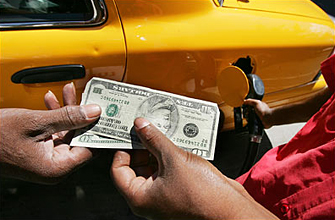 |
 |
 |
 Business News | May 2007 Business News | May 2007  
Cheap Gas Fuels a Mexican Migration
 Marla Dickerson & Elizabeth Douglass - LATimes Marla Dickerson & Elizabeth Douglass - LATimes


| | Vendors are girding for a rush of business Memorial Day weekend as Americans head to their Mexican vacation homes and take home a cheap souvenir in their tanks. |
Tijuana, Mexico - U.S. motorists are flocking to gas pumps south of the border to save 25 percent or more on the cost of a fill-up - courtesy of the Mexican government.

Worried about inflation, Mexican officials are keeping a lid on retail prices at the state-owned petroleum company Pemex. Regular-grade gasoline in this border town is selling for about $2.60 a gallon. With prices in California averaging $3.43 a gallon - and topping $4 at some stations - drivers such as Roger Moore are grabbing a deal while they can.

The 63-year-old management consultant owns a second home in Baja California. He made a point of stopping at a station here this week to top off the tank of his Ford minivan before heading back to West Hollywood.

"It costs $65 for a tank of gas up there, and it costs me $45 here," he said. "It's a monopoly, and it's cheaper!"

Mexican station owners, too, are pumped by the surge in business. Although they say few Americans are traveling to Mexico specifically to fill their tanks, many more than usual are taking advantage of the chance to buy cheap gas when they cross the border to work or play. They're also seeing increased sales to Mexican residents who work in the U.S.

Outlets along the nearly 2,000-mile border are serving more cars with U.S. plates. The jump is reflected in Pemex's pump sales, up 10.5 percent through the first four months of the year compared with the same period last year. Vendors are girding for a rush of business Memorial Day weekend as Americans head to their Mexican vacation homes and take home a cheap souvenir in their tanks.

"This has been very, very favorable for us," said Jorge Farfan Gonzalez, general manager of a franchisee that operates 17 Pemex outlets in Baja.

But some say that low-cost gas might not be such a bargain.

Mexican stations are notorious for dispensing short liters. And their fuel isn't as clean as that mandated in California. That's tough on the environment, and it could harm your vehicle too, said Rich Kassel, a clean-fuel expert with the Natural Resources Defense Council in New York. Mexico's regular gasoline is loaded with sulfur. Kassel said frequent fill-ups could wreak havoc on the catalytic converters of the newest cars and trucks sold in the U.S.

"This is the extreme version of driving across town to save a nickel," Kassel said. "It doesn't make sense if you ... end up with fuel that is dirtier and can damage your engine."

But the prospect of a big mechanic's bill down the road could not dissuade San Diego resident Miguel Duarte, who owns a house in the Mexican beach community of Rosarito, from fueling his Ford pickup at a Tijuana Pemex this week.

The quality "is not as good," he said of the $20 worth of fuel that he purchased. But "it's priced high in the United States."

The Mexican government regulates every aspect of the gas industry, including the retail price that consumers pay. There are two sets of prices: one for stations in select cities along the northern border and another for the rest of the country. Officials tend to peg border prices loosely to those in the U.S. so Mexican operators can stay competitive with American counterparts.

But as U.S. gas prices have soared, Mexico's border prices for regular have remained at 7.41 pesos a liter, or about $2.60 a gallon, for most of the year. Prices in the interior are even lower at 6.88 pesos a liter, or about $2.41 a gallon.

Rising demand is straining Mexico's refining capacity. In April, the world's No. 5 oil producer had to import almost 45 percent of its gasoline, Pemex statistics show. Most of that came from the United States. But the Mexican government hasn't boosted retail prices significantly to reflect tight supplies.

President Felipe Calderon, who has been on the job only six months, has little to gain by socking Mexicans at the pump.

"He needs to avoid any significant increase in inflation this year," said Christian Stracke, Latin America analyst with New York-based research company CreditSights. "Keeping gas prices stable helps him do that."

Calderon is certainly scoring points with U.S. motorists, who are voting with their feet - and their tires.

Juan Carlos Robles Hiusar, owner of a Pemex station in Mexicali, said cars with American plates accounted for nearly one-quarter of his weekend business, a three-fold increase from earlier in the year.

Ramiro Zuniga Salazar, head of the Association of Gasoline Dealers of Rosarito, says area stations are pumping about 20 percent more fuel than they were a few months ago. "The price difference is very attractive," Zuniga said. "We're talking about almost a dollar a gallon."

Whether the customers are Mexican or American, motorists would be well advised to pay attention. Mexico's top consumer watchdog last year launched a crackdown on dishonest station owners after random checks revealed that nine in 10 Pemex outlets rigged their pumps to dispense less than what their meters promise.

All Pemex stations are full service, but many of those attendants outfitted in jumpsuits with the official Pemex logo are unpaid freelancers hustling for tips - and the chance to shortchange distracted drivers.

Exchange rates vary, and some franchisees have been known to dilute their fuel with additives to stretch profits.

LATimes staff writer Cecilia Sanchez contributed to this report. Dickerson reported from Mexico City and Douglass reported from Tijuana. | 
 | |
 |



